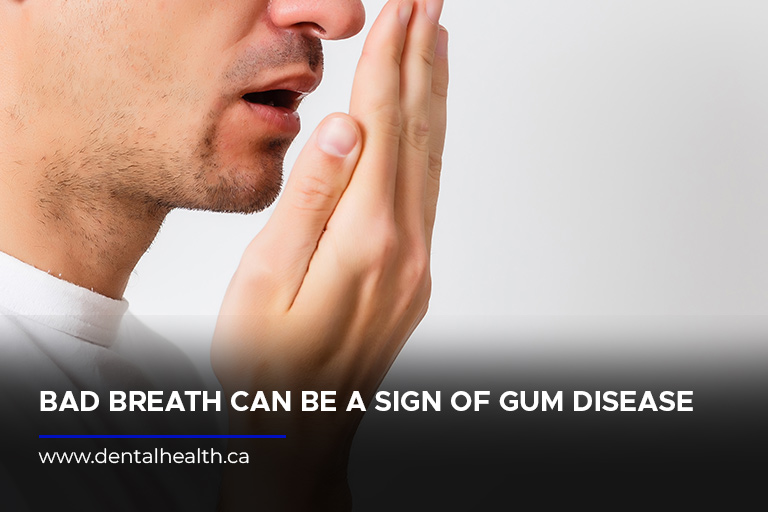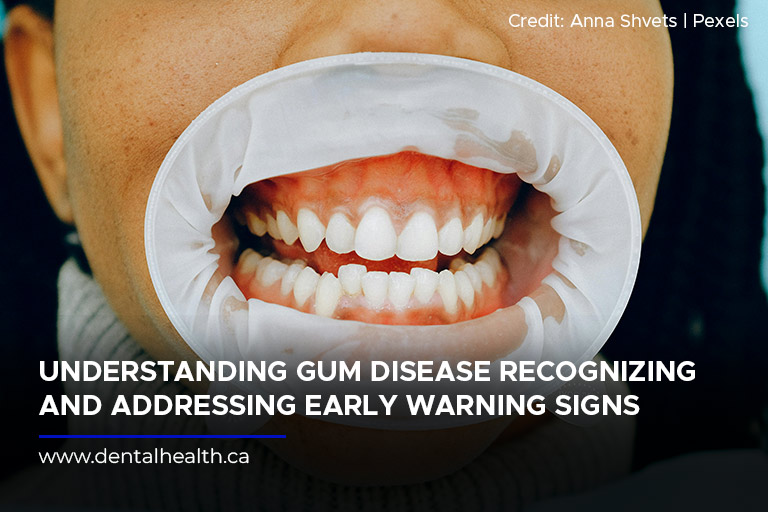Gum disease, often overlooked and underestimated, poses a significant threat to oral health. Its progression can be subtle, and without proper attention, it can lead to severe consequences. Let’s shed light on the early warning signs of gum disease, emphasizing the importance of timely intervention and professional care. Recognizing these signs is crucial in preventing the escalation of gum disease into more serious dental issues.
What is a Gum Disease?
Gum disease, also known as periodontal disease, begins with bacterial growth in the mouth and may end — if not properly treated — with tooth loss due to the destruction of the tissue that surrounds the teeth. While gum disease is incredibly common, many individuals fail to recognize its early symptoms, often dismissing them as minor inconveniences. However, early detection and treatment are key to managing gum disease effectively.
Gum disease encompasses a range of conditions that affect the tissues supporting the teeth. Types of gum disease include:
- Gingivitis: The earliest stage of gum disease, characterized by inflammation of the gums. Symptoms include red, swollen gums that may bleed easily when brushing or flossing. Gingivitis is usually reversible with good oral hygiene and professional dental care.
- Periodontitis: If gingivitis is not treated, it can advance to periodontitis. In this condition, the inner layer of the gum and bone pull away from the teeth and form pockets, which may become infected. This can lead to the destruction of the supporting bone and connective tissue, causing teeth to loosen or lead to tooth loss.
- Aggressive Periodontitis: This form occurs in patients who are otherwise clinically healthy. It is characterized by rapid attachment loss and bone destruction.
- Chronic Periodontitis: The most common form of periodontitis, this condition results in inflammation within the supporting tissues of the teeth, progressive attachment, and bone loss. It is more prevalent in adults but can occur at any age.
- Necrotizing Periodontal Disease: This type of gum disease is characterized by necrosis (death) of gingival tissues, periodontal ligament, and alveolar bone. These lesions are commonly observed in individuals with systemic conditions such as HIV infection, malnutrition, and immunosuppression.
Signs of Gum Disease

- Bleeding Gums
Healthy gums should not bleed. If you notice blood while brushing or flossing, it could be an early sign of gum disease, known as gingivitis. This condition occurs when plaque accumulates along the gum line, causing inflammation.
- Receding Gums
Gum recession is a condition where the margin of the gum tissue surrounding the teeth wears away or pulls back, exposing more of the tooth or the tooth’s root. Receding gums can be a sign of gum disease progression, leading to periodontitis.
- Persistent Bad Breath
Halitosis, or persistent bad breath, can be a symptom of gum disease. Bacteria in the mouth, particularly those hidden in pockets between the gums and teeth, can produce odours. Regular dental check-ups are important for identifying and treating the underlying causes.
- Red, Swollen Gums
Gums that are red, swollen, or tender are common indicators of gum disease. These symptoms result from inflammation caused by the body’s response to harmful bacteria present in plaque. Without treatment, this condition can advance, affecting the integrity of the teeth and jawbone.
- Loose Teeth
In advanced stages of gum disease, such as periodontitis, the structures that support the teeth, including the gums and bone, are damaged. This can lead to teeth feeling loose or shifting in the mouth, affecting your bite and overall dental health.
Common Causes of Gum Disease
- Poor Oral Hygiene
Failing to brush and floss regularly allows plaque to build up on teeth, hardening into tartar. This accumulation irritates the gum tissue, leading to gingivitis, the earliest stage of gum disease. If untreated, it can advance to periodontitis, causing gums to pull away from teeth and form pockets susceptible to infections.
- Smoking and Tobacco Use
Tobacco use significantly increases the risk of developing gum disease. It interferes with the normal function of gum tissue cells, making the mouth more vulnerable to infections, including periodontal disease. Smoking also hampers the flow of blood to the gums, which can affect the healing of gum tissue.
- Genetic Susceptibility
Genetics play a role in the likelihood of developing gum disease. Individuals with a family history of gum disease are at a higher risk, indicating that genetic factors can influence the severity of gum disease and the response to treatment. This genetic predisposition means that some people are more prone to gum disease, regardless of their oral hygiene practices.
- Hormonal Changes
Hormonal changes in women and girls, such as those occurring during puberty, pregnancy, menstruation, and menopause, can make gums more sensitive and more susceptible to gum disease. These changes can affect the blood supply to the gum tissue, leading to increased gum sensitivity and promoting conditions favourable for gum disease to develop.
- Medications
Certain medications can affect oral health by reducing saliva flow, which has a protective effect on the mouth. A decrease in saliva can lead to dry mouth, increasing the risk of gum disease. Some drugs, such as anticonvulsants and calcium channel blockers, can also cause abnormal growth of gum tissue, making it difficult to maintain proper oral hygiene.
Gum Disease Prevention

- Maintain Good Oral Hygiene
Brush your teeth twice daily using fluoride toothpaste and floss at least once a day. This removes plaque, the sticky film of bacteria that can cause gum disease. Ensure you’re brushing effectively, reaching all surfaces of your teeth and along the gumline. Consider using an electric toothbrush for a more thorough cleaning.
- Regular Dental Check-ups
Visit your dentist or dental hygienist regularly for cleanings and examinations. These visits are crucial for gum disease treatment, as they involve removing tartar, a hardened form of plaque that brushing alone can’t remove and detecting early signs of gum disease. Early detection allows for simpler, less invasive treatments.
- Quit Smoking
Smoking is strongly associated with the onset of gum disease, as it weakens your immune system and makes it harder for your body to fight off infections, including those that affect the gums. Quitting smoking can significantly reduce your risk of developing gum disease and improve your overall oral health.
- Eat a Balanced Diet
Consuming a diet rich in vitamins, minerals, and antioxidants can help your body fight infections, including gum disease. Foods high in vitamin C and calcium support gum health. Avoid sugary snacks and drinks as they can contribute to plaque formation and gum disease.
- Use Therapeutic Mouthwash
Incorporate an antimicrobial mouthwash into your daily oral care routine. These mouthwashes can help reduce plaque, prevent or reduce gingivitis, and decrease the speed at which tartar forms. Look for products with the Canadian Dental Association (CDA) seal of approval for effectiveness and safety.
If you’re experiencing any of the warning signs of gum disease, it’s important to consult a dentist in Beamsville immediately. Kingsway Family Dentistry offers comprehensive dental care to ensure your oral health is on the right track. Schedule an appointment today at (905) 563-4001.

